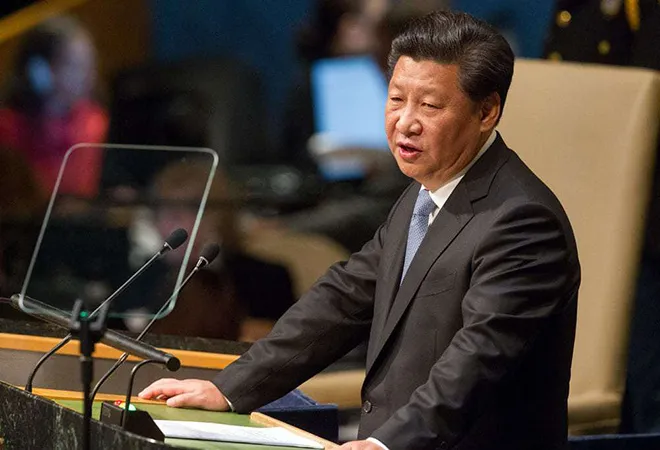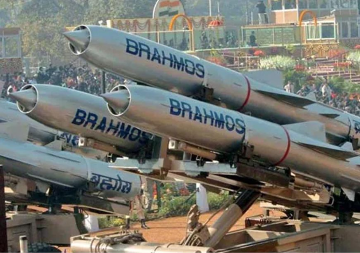
The United States under President Donald Trump has shown little patience for multilateralism – it has slashed contributions to the United Nations, walked out of several UN agencies, and ceded leadership.
As Trump pivots away from multilateral bodies, he is leaving vast amounts of real estate for China to occupy. China’s financial muscle and army of young diplomats are slowly adding up to real clout.
Just follow the money -- last year, the Trump Administration cut $285 million from its share of the 2018-19 UN budget, and announced this May it would also cut contributions for UN peacekeeping. China, meanwhile, has climbed to become the third largest contributor to the UN’s regular budget and the second largest to UN peacekeeping missions.
The Trump Administration has also pulled out of the UN Human Rights Council, blocked $300 million for UN Relief and Works Agency which helps Palestinian refugees, shut down the office of the Palestine Liberation Organisation in Washington, and most recently threatened judges of the International Criminal Court if they dare launch any investigation against the US or Israel for alleged war crimes.
It’s no secret US moves are influenced by Israel to a great extent. Israel and key pro-Israel US donors have lobbied hard for a US exit ever since Trump got elected. Israel calculates that with the US gone, the multilateral body’s condemnations of its treatment of Palestinians will have little credibility.
Taking full advantage of the vacuum, China is stepping in and trying to shape the UN system to its advantage, working patiently resolution by each resolution to upend long-held positions and traditions. This is hardly good news for the long-term health of the United Nations.
China has deftly used its financial sway over countries to push through its agenda while the western bloc gets more and more divided. NGOs that don’t loudly affirm Beijing’s “One China” policy find they can’t register with the UN easily.
The success has been heady – China’s official news agency Xinhua trolled Trump with an interactive feature about “tracking America’s exit from the international community” since he took office.”
Russia, Pakistan and some African countries are active participants in this Chinese project, enabling Beijing to outmaneuver other, offering amendments and weakening resolutions. The idea is to introduce the same restrictive and intolerant attitudes at the international level that they practice at home.
China’s attempt at this thought hegemony – Xi Jinping thought no less -- goes side-by-side with its effort to physically bind large parts of the world under the Belt Road initiative. It’s becoming about “win-win outcomes” and “mutually beneficial cooperation” even at the United Nations.
No where are China’s “influence operations” more apparent than in the UN Human Rights Council where the main delegates’ lounge this month was filled with huge posters about China’s exemplary treatment of its Tibetan and Uighur minorities.
This in light of multiple and persistent reports about China running massive internment camps for Uighurs to “reeducate” them and forcing them to eat pork is nothing short of appalling.
The US withdrew from UNHRC earlier this month after a year of complaints, calling the body “hypocritical and self-serving.” Nikki Haley, the US ambassador to the UN, said it has a “chronic bias against Israel.”
It is true that Israel is a stand-alone agenda item on UHRC allowing the council to hold special sessions on its conduct while all other countries come under a separate, common rubric. It is also true that given the structure and composition of the United Nations, sympathy for the Palestinian cause is natural among many states.
But surely Israel can see that the US presence on the Council vastly mitigated the negative attention it would otherwise have got. In the first three years of UNHRC’s founding in 2006 before the US joined the body, Israel was condemned in six special sessions while human rights issues in the rest of the world got the same number of sessions.
The balance improved since Washington’s entry in 2009 – two special sessions on Israel and 13 on the rest of the world. Israel lobbying the US to withdraw from UNHRC makes little sense because in the hands of China and Russia, it will likely do worse.
China is now front and centre in Geneva, steadily blocking criticism of its own policies while promoting sovereignty above all else. Memories of post-Tiananmen are long gone as is China’s defensive posture when it was content to defeat resolutions critical of its conduct.
Under President Xi Jinping, China’s successfully won a seat on UNHRC despite the country’s dubious human rights record while promising to “strengthen the development of democracy and the rule of law.”
Irony has long been dead at the Council where Saudi Arabia sits as a member but even so, the China has taken subversion of internationally accepted norms to a new level. The Chinese model being pushed underplays individual rights and promotes collective human rights, even though collective rights of Tibetans or Uighurs fall clearly short.
The clever attempts are aimed at weakening the position of “human rights defenders” and their activities by inserting language that questions the legality of their actions and their legitimacy to speak for a particular group. The idea is to ultimately override UN General Assembly resolutions that recognize “human rights defenders” as a group.
As Ted Piccone of the Brookings Institution and a former Clinton Administration official noted in a recent report, China is today both “an active participant and a key influencer of other countries’ votes” at a time when the Council’s “chief protagonist, the United States, has absented itself from the field.”
As other players scramble, the force seems clearly to be with one large and hefty player.
The views expressed above belong to the author(s). ORF research and analyses now available on Telegram! Click here to access our curated content — blogs, longforms and interviews.




 PREV
PREV


